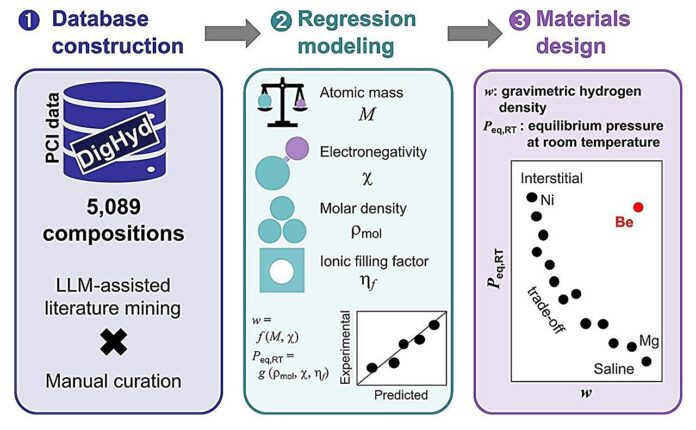Hydrogen fuels offer a pathway to clean energy, but practical adoption hinges on efficient storage solutions. Current methods—high-pressure tanks or cryogenic cooling—consume substantial energy, undermining hydrogen’s environmental benefits. Metal hydrides, materials that absorb and release hydrogen reversibly, represent a promising alternative. Recent research, leveraging a new AI-powered platform, has pinpointed fundamental atomic properties that dictate hydrogen storage performance, potentially accelerating the discovery of superior materials.
The Digital Hydrogen Platform: A New Tool for Materials Science
Researchers at Tohoku University have developed the Digital Hydrogen Platform (DigHyd), an AI-driven infrastructure integrating over 5,000 meticulously curated experimental records. This platform, combined with an advanced language model, enables accurate prediction of hydrogen storage metrics. The work, published in Chemical Science, marks a shift toward data-driven materials design.
Interpretable AI Reveals Key Atomic Descriptors
The research systematically explored physically interpretable models, identifying atomic mass, electronegativity, molar density, and ionic filling factor as critical descriptors of hydrogen storage performance. Unlike opaque “black-box” machine learning approaches, DigHyd’s white-box regression model maintains full transparency, revealing how predictions are made. This interpretability allows scientists to understand why certain materials excel, guiding targeted design efforts.
The Fundamental Trade-Off in Metal Hydrides
The study confirmed a long-standing trade-off in metal hydride design: light, electropositive compounds exhibit high storage capacity but poor hydrogen release at room temperature, while heavier transition metals release hydrogen more readily but at reduced capacity. Surprisingly, beryllium-based alloys emerged as unique systems capable of balancing these conflicting characteristics, offering both high storage density and suitable thermodynamic stability.
Accelerating Materials Discovery: A New Paradigm
This work establishes a scalable methodology for accelerating materials discovery in energy research. The descriptor-based framework connects data-driven analysis with physical understanding, providing a transparent foundation for designing high-capacity hydrogen storage materials. This approach can be extended to complex alloys and porous structures, paving the way for safe, efficient, and carbon-neutral energy technologies.
“Not only does this white-box regression model make accurate predictions, but it maintains full physical interpretability,” explains Hao Li, Distinguished Professor of the Advanced Institute for Materials Research (WPI-AIMR), Tohoku University.
This research signifies a critical step toward overcoming the energy storage hurdle that has long hampered the widespread adoption of hydrogen as a clean fuel source. The combination of AI-driven analysis and fundamental physical understanding promises to accelerate the development of next-generation hydrogen storage systems































